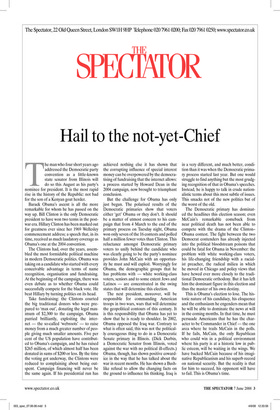Hail to the not-yet-Chief
The man who four short years ago addressed the Democratic party convention as a little-known state senator from Illinois will do so this August as his party’s nominee for president. It is the most rapid rise in the history of the Republic: not bad for the son of a Kenyan goat herder.
Barack Obama’s ascent is all the more remarkable for whom he has passed on the way up. Bill Clinton is the only Democratic president to have won two terms in the postwar era. Hillary Clinton has been marked out for greatness ever since her 1969 Wellesley commencement address; a speech that, in its time, received as much laudatory coverage as Obama’s one at the 2004 convention.
The Clintons had, over the years, assembled the most formidable political machine in modern Democratic politics. Obama was taking on a candidate who started with every conceivable advantage in terms of name recognition, organisation and fundraising. At the beginning of the campaign, there was even debate as to whether Obama could successfully compete for the black vote. He beat Hillary by turning politics on its head.
Take fundraising: the Clintons courted the big traditional donors who were prepared to ‘max out’, donating the legal maximum of $2,300 to the campaign. Obama parried brilliantly, exploiting the internet — the so-called ‘webroots’ — to raise money from a much greater number of people giving much smaller amounts. Five per cent of the US population have contributed to Obama’s campaign, and he has raised $265 million, of which almost half has been donated in sums of $200 or less. By the time the voting got underway, the Clintons were reduced to complaining about being outspent. Campaign financing will never be the same again. If his presidential run has achieved nothing else it has shown that the corrupting influence of special interest money can be overpowered by the democratising of fundraising that the internet allows: a process started by Howard Dean in the 2004 campaign, now brought to triumphant conclusion.
But the challenge for Obama has only just begun. The polarised results of the Democratic primaries show that voters either ‘get’ Obama or they don’t. It should be a matter of utmost concern to his campaign that from 4 March to the end of the primary process on Tuesday night, Obama won only seven of the 16 contests and polled half a million fewer votes than Clinton. This reluctance amongst Democratic primary voters to unify behind the candidate who was clearly going to be the party’s nominee provides John McCain with an opportunity he must and will exploit. Worryingly for Obama, the demographic groups that he has problems with — white working-class voters, seniors and to some extent Jews and Latinos — are concentrated in the swing states that will determine this election.
The next president, moreover, will be responsible for commanding American troops in two wars, wars that will determine the geopolitical contours of this century. It is this responsibility that Obama has yet to show that he is ready to shoulder. In 2002, Obama opposed the Iraq war. Contrary to what is often said, this was not the politically courageous thing to do in a Democratic Senate primary in Illinois. (Dick Durbin, a Democratic Senator from Illinois, voted against the war with no political ill-effects.) Obama, though, has shown positive cowardice in the way that he has talked about the war in recent months. He has shown a Bushlike refusal to allow the changing facts on the ground to influence his thinking. Iraq is in a very different, and much better, condition than it was when the Democratic primary process started last year. But one would struggle to find anything but the most grudging recognition of that in Obama’s speeches. Instead, he is happy to talk in crude nationalistic terms about this most subtle of issues. This smacks not of the new politics but of the worst of the old.
The Democratic primary has dominated the headlines this election season; even McCain’s remarkable comeback from near political death has not been able to compete with the drama of the Clinton– Obama contest. The fight between the two Democrat contenders has already injected into the political bloodstream poisons that could be fatal for Obama in November: the problem with white working-class voters, his life-changing friendship with a racialist preacher, the radical milieu in which he moved in Chicago and policy views that have hewed ever more closely to the traditional Democratic orthodoxy. But it has left him the dominant figure in this election and thus the master of his own destiny.
This is Obama’s election to lose. The historic nature of his candidacy, his eloquence and the enthusiasm he engenders mean that he will be able to dominate the news at will in the coming months. In that time, he must persuade Americans that he has the character to be Commander in Chief — the one area where he trails McCain in the polls. If he fails, McCain, the only Republican who could win in a political environment where his party is at a historic low in public esteem, will be waiting in the wings. We have backed McCain because of his imaginative Republicanism and his superb record on national security. But the reality is that for him to succeed, his opponent will have to fail. This is Obama’s time.










































































 Previous page
Previous page